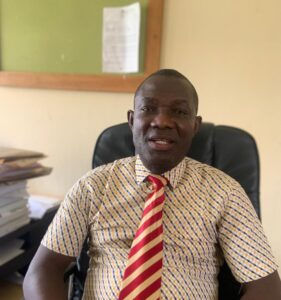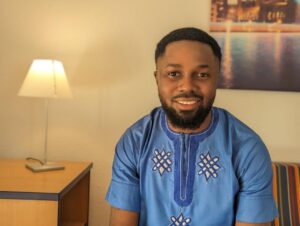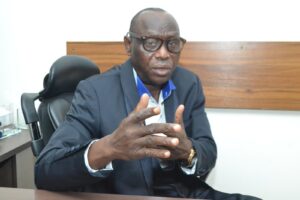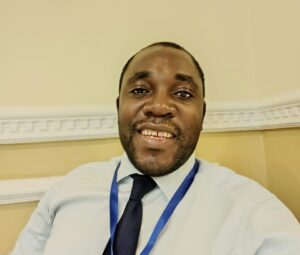Segun Adeniyi, erstwhile presidential spokesman, is a popular journalist, and now, a very visible author. His last book, “Power, Politics and Death” is still selling hot in Lagos Traffic, several months after it was released. I delayed the request for the interview until now to confirm he achieved the rare feat of making millions from one book in Nigeria. Segun talks about the book and his writing.
Your last book is still selling in “Lagos traffic”. It is a measure of its popularity. You must have sold over a million copies?
Far from it. In any case, all the copies you see on traffic are pirated copies and I wouldn’t know how many copies pirates have sold.
You must be the only author in Nigeria who can live on writing?
I bet there are many people in Nigeria who live on writing and I must say that regardless of the hype about my book on the Yar’Adua years, my first real break in book writing was “The Last 100 Days of Abacha”. I made some tidy money from that even though I wrote it basically to dissuade President Obasanjo from seeking an extra-constitutional third term in office. It was published in August 2006. It is actually an interesting story because the idea didn’t come from me. In one of my columns, I wrote on the people who were campaigning for the late General Sani Abacha to transmute into a civilian leader, warning that they were the same politicians asking Obasanjo to continue and I named names. It was a very popular piece and someone suggested that I could write a book on it. I recall that Mr. Chris Oshiafi, who owns BookHouse had been saying he would readily publish if I wanted to compile my columns into a book so I called him that I had an idea. I told him if he would publish I could write a book on Abacha’s Transition politics and we would share the profit 50-50. It was my senior colleague, Kayode Komolafe who gave me the title after I finished the manuscript because the title I had for it was long and the late Mr. Godwin Agbroko did the editing for me. I recall that before going to press, Mr. Oshiafi brought a contract paper to my office and I tore it. I said being my friend, we needed no contract and that was it. I wrote the book, he published it and we both made money because it sold. Actually that was what persuaded me I could make money by writing books.
Anyway what do you feel about the success of the Yar’Adua book?
As a writer yourself, you are well aware of the fulfilment that comes with knowing your work is generally accepted. Money is not the consideration and I don’t think any serious writer writes just for money. You write when you think you have a message. If money comes from it, that’s a bonus. I wrote the Yar’Adua book because I knew I have story and I am lucky in that it is generally well accepted, many people have read it and I made some small money from my effort.
It made you a few enemies?
If it did, I am not aware.
Did you tell the late President you were going to write a book about Aso Rock?
I never imagined things would turn out so sadly. I didn’t reckon that he would die in office. If things had worked well and I had served him for four years and I left, I definitely would have told him if he was alive. Even though I had it at the back of my mind that I would write about my stewardship, the way everything ended dramatically made it even more compelling for me to document some of the things he did in office, as well as disabuse the minds of Nigerians about some of the distortions about his last days. I am surprised that people make it look as if I did anything special by writing a book after leaving office. In the last one year, I must have received no fewer than a hundred self-published books by people who have either served in government or in the private sector documenting their experiences. Some of these books are so rich but people are not aware of them may be because they are not journalists. I guess my book is popular because I am visible as a reporter.
Would you advise Abati to write about President Jonathan?
Reuben doesn’t need any advice from me in that direction. He will do whatever he considers right for him to do when the time comes. He also knows he will always have my support.
I know you have fertile memory. Did you have to do any research for the book? It is rich, factual.
Memory? I also kept records.
We know Segun the journalist. Who is Segun the author?
Talk about your writing.
I am basically a reporter and it reflects in my writings which I know put some people off. I have read some criticisms like “oh, Segun name-drops” and all that stuff. But it’s a matter of style. Take Reuben Abati for instance, he is a writer, he has always been and I cannot compete with him in that area because he has the language which I do not have. But my strength is that I started out as a political reporter, I am a field person, I meet people, high and low and I witness events. The point, however, is that if in a column I report on an issue concerning a farmer, a village person or a poor person, there will be no issue but let that person be a “big man”, then it’s Segun is name-dropping again. But it really doesn’t bother me so long as my message is clear.
How do you feel being an author?
I don’t feel anything really though I derive pleasure in the fact that people read what I write whether it is a book or a column.
How many books have you written?
My first one was “Before The Verdict”, which I wrote before the 1992 presidential primaries of the Social Democratic Party (SDP). In it I profiled the then 12 presidential aspirants. The second was “Fortress on Quicksand”, after they were all disqualified. That was published in 1993 the third was “POLITRICKS: National Assembly under Military Dictatorship” in 1994 and then “Abiola’s Travails” in 1995 after which I wrote the “Last 100 Days of Abacha” in 2006. Because of my love for writing, I spent my meagre salaries publishing those books and those were very tough days, especially as I was with Concord that had challenges with our chairman, Bashorun Abiola in incarceration. But the encouragement I got from some people sustained me. For instance, even though I was in Concord then, the only person who gave me money for my book on Abiola was Chief Ajibola Ogunsola, then the Chairman of Punch and it was a tidy sum. I will never forget and that’s why he remains one of my mentors in this profession. And for “PoliTricks”, it was Comrade (now Senator) Uche Chukwumerije who also sent me a moving letter after reading it. He is another person I can never forget. Those were the kinds of encouragements I got along the way.
Any novels yet?
I have one in my head, it’s been there for years really but I don’t know whether I will ever have the discipline or even the literary expertise to do it. I am not so sure I have the capacity to do it but I have a rough idea of what the story is about.
What are you writing now?
I am working on a book that has to do with 100 years of Nigeria but it’s not focused yet so I don’t know if I can pull it off though I have other ideas.
I know you read a lot. Who are you reading now?
Right now I am not reading anything even though I have several new books on my shelf. But during the Christmas holiday I read a couple of books, including Dr Peter Odili’s memoir, “Conscience and History” and that of Mallam Shehu Garba, spokesman to former Vice President Atiku Abubakar.
Any rivalry between journalism and being an author?
Well, a journalist can be an author but I do not subscribe to this notion that every writer/author is a journalist. To be a journalist, as far as I am concerned, you must be a reporter. I happen to be one.
What would you consider as your best achievement in journalism?
I am still in the business so I don’t think I have achieved anything yet. I guess its people like Mr. Dele Olojede who has a Pulitzer Prize to his name who can talk of real achievement in this profession.
Generally, how do you write?
I simply just write once I feel strongly about an issue or I experienced something interesting I feel like sharing.
How do you get your inspiration? Does it come to you or you go chasing it?
As a reporter, you must read so I do that and from that inspiration often comes.
Any writing habit you have developed over the years?
I don’t know whether it is a habit and I don’t feel comfortable with it but now it’s difficult for me to write on paper. If you give me a paper and tell me to write a composition, I would find it difficult to do so, it has to be on a computer. Without a laptop, I am lost and I don’t know whether that is good.
What have been the stumbling blocks in your writing?
Perhaps what I have just described, the over-reliance on gadgets.
Your hobby?
Do I really have any except that I am one of those football lunatics. I am an Arsenal fan by the way and with the way Arsene Wenger deals with us, you just can imagine my constant frustration.
When you are charged up by writing, what is your favourite food and drink?
For me, there is no formula. I can write when I am hungry or when I am full.
Your favourite drink?
Cocacola. It’s almost an addiction.
What is the opportunity cost of writing to you?
Perhaps my wife would be in a better position to answer that.
Interview by Bisi Ojediran published in Thisday Newspaper of January 22, 2013





